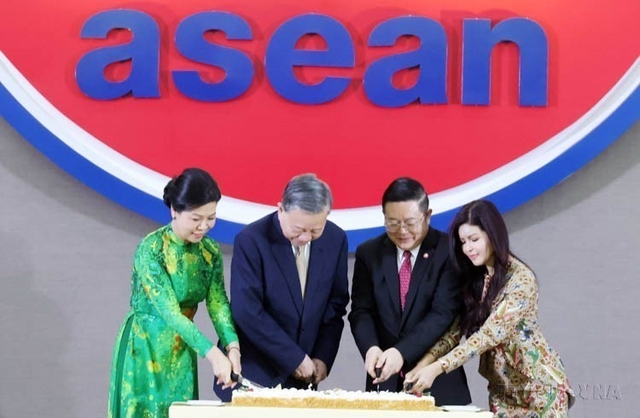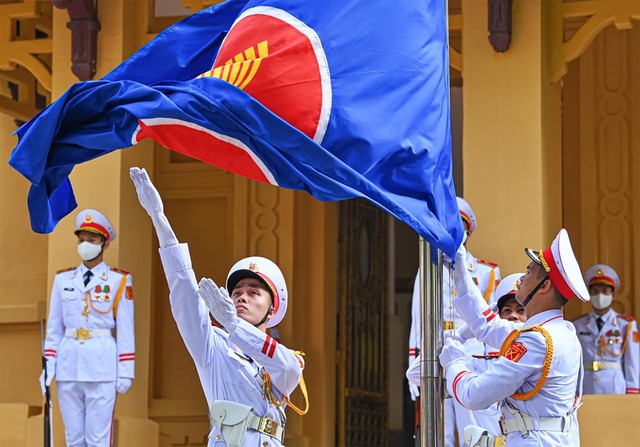Viet Nam plays vital role in shaping ASEAN’s Future
VGP - Marking 30 years of ASEAN membership, Viet Nam has made substantial and practical contributions to the Association’s growth and achievements, solidifying its status as one of the bloc’s most dynamic and proactive members.

Party General Secretary To Lam attends ceremony marking 30 years of Vietnam’s ASEAN membership. (Photo: VNA)
Viet Nam officially joined ASEAN as its seventh member on July 28, 1995, during the 28th ASEAN Foreign Ministers' Meeting in Brunei. This landmark decision by the Vietnamese Party and State was a pivotal step toward comprehensive international integration.
Since then, Viet Nam has actively engaged in all pillars of ASEAN cooperation. Through persistent efforts to strengthen intra-bloc solidarity and foster both regional and external partnerships, the country has significantly contributed to ASEAN's success. Guided by the principles of proactiveness, positivity, and responsibility, Viet Nam has become a key force in enhancing ASEAN's unity and reinforcing its centrality in regional and global affairs.
Viet Nam undertook the ASEAN Chairmanship on three occasions—in 1998, 2010, and 2020. Only three years after joining ASEAN, Viet Nam hosted the 6th ASEAN Summit in December 1998, which led to the adoption of the landmark Ha Noi Plan of Action. This strategic document laid the groundwork for closer regional cohesion and shaped the pathway toward realizing the ASEAN Vision 2020.
During its 2010 chairmanship, Viet Nam focused on translating ASEAN's collective vision into concrete action. Key achievements included the adoption of the first Master Plan on ASEAN Connectivity (MPAC 2015), the expansion of the East Asia Summit to include Russia and the United States, and the establishment of the ASEAN Defense Ministers' Meeting Plus (ADMM+).
In 2020, facing the global upheaval caused by the COVID-19 pandemic, Viet Nam demonstrated strong leadership by fostering unity and resilience across the ASEAN Community. It pioneered the use of virtual summits and introduced timely initiatives to ensure institutional continuity, strengthen the bloc's adaptive capacity, and support post-pandemic recovery.
Beyond its rotational leadership, Viet Nam has made meaningful contributions to the strategic direction of ASEAN. It has played an instrumental role in shaping key regional frameworks such as the Ha Noi Plan of Action (1998), ASEAN Vision 2020 (1997), the Declaration of ASEAN Concord II (2003), the ASEAN Charter (2007), and the ASEAN Community Vision 2025 (2015). The country continues to actively engage in shaping ASEAN's post-2025 vision, with a forward-looking outlook toward 2045.
At the 43rd ASEAN Summit held in Indonesia in September 2023, Viet Nam proposed the establishment of the ASEAN Future Forum—a complementary platform to ASEAN's formal structures—intended to foster open dialogue, exchange of ideas, and regional cooperation. This initiative reflects Viet Nam's commitment to building a resilient, sustainable, and forward-thinking regional community.

The ASEAN flag-raising ceremony
Viet Nam - 'Peace lighthouse' in the region
Vietnamese Ambassador to ASEAN Ton Nu Ngoc Thanh reaffirmed Viet Nam's commitment to working closely with fellow member states to advance ASEAN's new development phase, particularly the implementation of the ASEAN Community Vision 2045. She stressed that amid today's rapidly evolving and unpredictable regional and global landscape, Viet Nam is determined to help the bloc navigate emerging challenges.
"With the strong foundation built over the past 30 years, Viet Nam's role, position, image, and voice within ASEAN will continue to grow in prominence and recognition among member states and international partners," Ambassador Hạnh emphasized.
Echoing this view, ASEAN Deputy Secretary-General for Community and Corporate Affairs, Tran Duc Binh reiterated that ASEAN's founding mission has always been to promote peace, security, cooperation, and shared prosperity in the region. The complex dynamics and challenges of each era, he noted, have compelled ASEAN to continuously seek and implement effective cooperative strategies to adapt and succeed.
Viet Nam will work closely with other ASEAN members to help realize the region's full potential and address emerging challenges. This includes efforts to build an inclusive, sustainable regional architecture that is interconnected across political, security, economic, trade, cultural, social, and people-to-people dimensions. At the same time, Viet Nam emphasizes that adherence to the United Nations Charter and international law is the most fundamental and effective approach to ensuring peace, stability, and prosperity in the region and the world./.
Viet Nam is widely recognized as an active and assertive member in efforts to strengthen ASEAN unity. From a regional security perspective, particularly concerning the East Sea, the nation has maintained a clear and consistent stance, while also demonstrating a constructive and responsible approach, particularly in advancing the Code of Conduct (COC) in the East Sea.
Dinna Prapto Raharja, a researcher at Indonesia's Synergy Policies said that Viet Nam's proactivity and consistency have positioned it as a key player in upholding the rule of law through constructive dialogue and peaceful negotiation between ASEAN and China. Viet Nam has become an influential voice in pushing forward the COC negotiations. Together with Malaysia and the Philippines, Viet Nam is seen as a frontrunner in advocating for respect for international law and the rule of law, thereby contributing to a stable and transparent maritime security environment in the region.
With a development vision toward 2045, a milestone by which the bloc aims to become a comprehensive community and Viet Nam aspires to reach developed, high-income status, Beni expressed confidence that the country will continue to play a pivotal role in shaping the region's trajectory.
By 2045, Viet Nam will stand as a driving force behind ASEAN's continued centrality within the Indo-Pacific architecture, helping to sustain a resilient, integrated, and people-centered ASEAN./.

